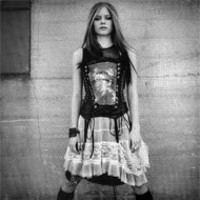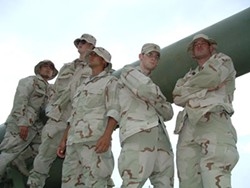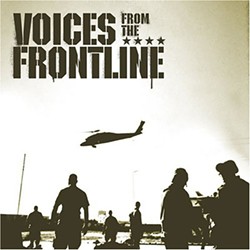Page 3 of 4
These are just a few of the stories that have made Voices from the Frontline a hit with hawks and doves alike in the weeks since its release. Based on the early success of the CD, Spielman has plans for a second volume. Meanwhile, he says he has received serious offers regarding movie, television and music videos for Voices from the Frontline.
For Spielman, though, the greatest satisfaction comes from the personal responses he's received since the disc's late-April release, "from soldiers telling us that this CD has given so many people in the military an outlet for their pain, literally."
The most touching letter, he says, came from a wheelchair-bound Vietnam vet in a VA hospital in Los Angeles. He said of listening to Voices from the Frontline: "Today I saw the first sunshine in a very dark world."
Voices brings to life Joel Spielman's vision of a musical combat diary. For listeners, the songs offer a glimpse of a world most will never know. For the soldiers themselves, hip-hop served a more immediate function. Most of the raps, such as those on "Some Make It, Some Don't," "Rest 'n' Peace" and "Raiders in Najaf," originated as catharsis, a way for the soldiers to process what they were experiencing.
"Making an album was the furthest thing from my mind. I didn't think that was ever a possibility," says Tomlinson. "I couldn't write letters home because I didn't want to portray the wrong message. I didn't know what I was doing. It's hard for me to talk. However, you play a beat, I'll go for hours. That became my way to cope with what I dealt with."
Tomlinson says many of the soldiers got together in cyphers, bringing together superior officers with privates. In the cypher, everyone was equal, he says, giving soldiers of all rank a chance to escape the hierarchical structure of the military. It was a unique opportunity for the Army's rank-and-file to express themselves.
"In the Army we all have rank structures. To have a private come up and talk to a sergeant, it ain't gonna happen. You turn a beat on and let them talk to each other through music, it's not disrespectful. That's how it was," says Tomlinson. "My privates that were into rap could come out and rap with me and not have to worry about it. It actually helped them out because it allowed them to let their guard down and not have to worry about getting yelled at. It gave them a way to relax. We did it together. It brought us closer together as a team, unifying us.
"I don't look at it as being unprofessional because it wasn't a disrespectful conversation," he adds. "It didn't pertain to the Army. The words did, but the next day he wasn't calling me Chris in the truck. I'm still Sgt. Tomlinson; he knows that. But it gave him that 20 minutes to actually feel normal, and it gave me that time to feel normal, like I was back home talking to my friends. Everybody out there, regardless if they're a private or a master sergeant, we're all friends or else we wouldn't fight for each other so hard."
[im-6]It's a release valve that, at least musically speaking, wasn't available to earlier generations of soldiers. However, Tomlinson sees examples of hip-hop in different forms in earlier wars.
"Their way out, their way to express it, was poetry," he says. "I look up everything on the Internet, from WWII to the Civil War, of poets just writing what they can write to put it out there. Well, half of hip-hop is poetry."
Spielman likens it to a scene in the Civil War film Glory.
"There's a scene before they go into their final battle where most of them get killed, and they're just hymning. They're freestylin'," he says. "They were clapping hands and just going back and forth with each other. It goes back to those times ... They're just clapping and the chorus is, 'Oh my lord, lord, lord,' and each of them has their own part where they just make things up about what they've been through together. If that's not freestylin' I don't know what is."
Soldiers' letters have served as both inspiration and lyrics for songs in other musical genres as well. Last year, the punk band the Dropkick Murphys released "Last Letter Home," a song that incorporated excerpts of correspondence between Sgt. Andrew Farrar and his family prior to Farrar's death on the battlefield. Tomlinson references Seattle hard rock band Alice in Chains and its early-1990s hit "Rooster," the lyrics of which were taken from a letter lead singer Layne Staley's father wrote while serving in Vietnam.
Speaking of 5.00000
-
A Family Affair
Dec 12, 2007 -

Darrell Roach
Dec 12, 2007 -
Body Talk
Dec 12, 2007 - More »
Latest in Cover
More by Vince Darcangelo
-
Spit on This
May 31, 2006 -

Punk Rock Girl Please Look At Me
Jun 1, 2005 - More »
Calendar
-

Wine & Paint @ Blackfinn Ameripub- Ballantyne
-

Queen Charlotte Fair @ Route 29 Pavilion
-

NEW WINDOW GALLERY-Pat Rhea-ACRYLIC PAINTINGS-April 05-30 2024 VALDESE, NC 28690 @ New Window Gallery/Play It Again Records
- Through April 30, 12 p.m.
-

TheDiscountCodes
-

Face to Face Foundation Gala @ The Revelry North End
-
Esports in Charlotte Takes Off: A Guide to Virtual Competitions and Betting
-
Homer's night on the town 41
If you drank a shot with the Knights mascot on Sept. 20, you were basically harboring a fugitive
-
Beauty Industry Trends To Look Out For In Charlotte In 2022











